EXPLAINED: What will a far-right government mean for Italy?
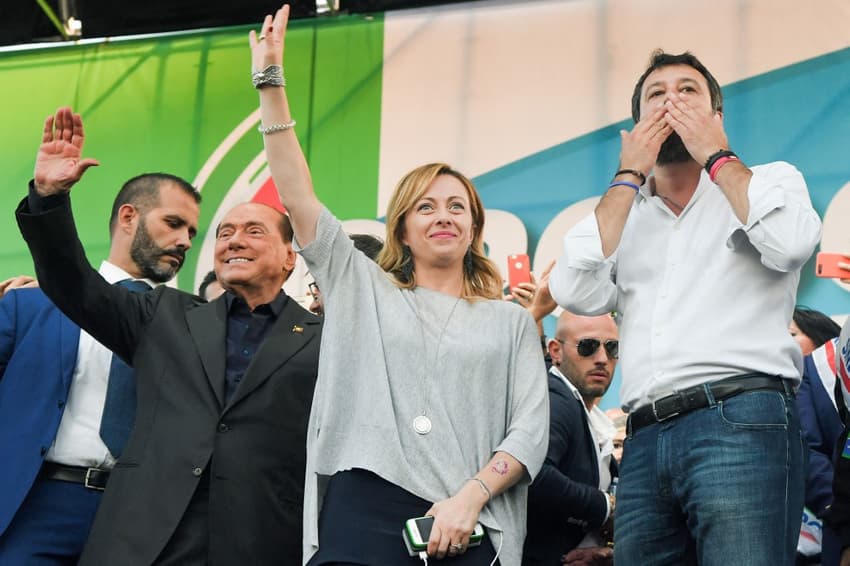
EU reform, 'flat tax' and welfare cuts - here are the main points of the joint programme agreed by the right-wing coalition that triumphed in Sunday's elections in Italy.
The three parties that make up Italy’s so-called centrodestra, the right-wing coalition that has stormed the polls and is now expected to form a government with a large majority, campaigned on a joint manifesto that promised to slash taxes and put ‘Italians first’ - whatever the cost.
The contents of the programme were agreed in advance between Giorgia Meloni's post-fascist Brothers of Italy, Matteo Salvini's populist League, and Silvio Berlusconi's conservative Forza Italia.
Meloni's success - topping the polls, well ahead of her allies - will likely affect how and if these pledges are implemented.
FdI is the most far-right of the three parties, so with them leading the government we can expect a focus on policies that align with its strongly nativist, conservative ideology.
Pledges made throughout the manifesto lack detail, but here’s an idea of what they’re promising to deliver once in power.
Economy and social policy
While the programme says Italy should make “full use” of the almost 200 billion euros ($193 billion) earmarked under the EU's post-pandemic recovery plan, it also talks about changing the agreement with Brussels.
Italy’s previous government agreed to major structural reforms in return for the money, which Meloni’s party appears keen to renegotiate.
The manifesto says there are "changed conditions", noting rising costs of energy and raw materials.
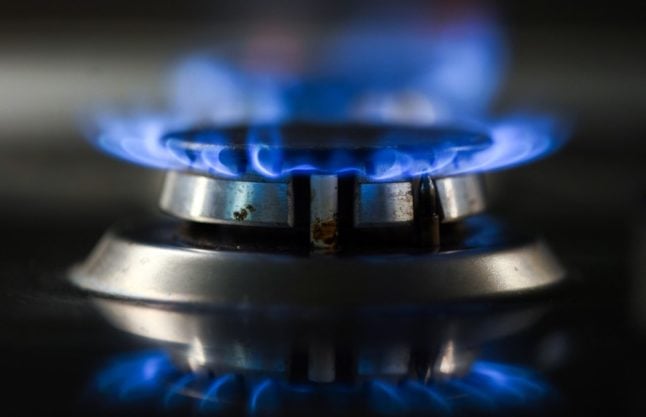
The right-wing coalition has promised to protect households from soaring energy bills, though no concrete details have been given so far. Photo by Ina FASSBENDER / AFP
It calls for a reduction in the tax burden for families, businesses and the self-employed, including a flat tax for the latter. No detail was given as to how the parties plan to cover the cost of their vote-winning flat tax policies.
It pledges to abolish the citizens' income, Italy’s first ever unemployment benefit introduced under the populist Five Star Movement. It’s not clear whether anything would replace it.
The programme also calls for a revaluation of the minimum pension, social and disability payments.
As inflation soars, there’s a promise to protect the purchasing power of families, workers and pensions, and reduce VAT on energy products.
Europe and Russia
Salvini and Berlusconi have long been close to Russia. Berlusconi last week caused outrage by defending his old friend Vladimir Putin’s invasion of Ukraine, while Salvini has been highly critical of European sanctions.
Despite this, the programme emphasises respect for commitments made as part of NATO and support for Ukraine in the face of Russia's invasion.
READ ALSO: Outcry in Italy after Berlusconi defends Putin’s invasion of Ukraine
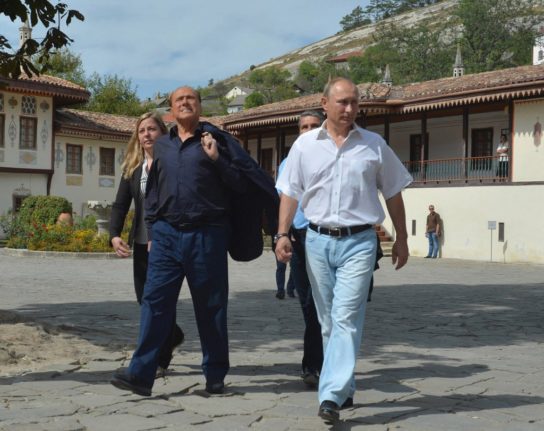
Forza Italia leader Silvio Berlusconi is a long-time friend of Putin's and has recently defended the Russian president's invasion of Ukraine. Photo by Alexei DRUZHININ / Ria NOVOSTI / AFP
Meloni has backed the sanctions, and the sending of weapons to Kyiv - though in 2014 she voiced her support for Russia’s annexation of Crimea, so it’s not clear how credible her stance is or if it could change.
With Meloni and Salvini's parties both eurosceptic, the programme commits to "full adherence to the European integration process" while seeking a "more political and less bureaucratic" bloc.
READ ALSO: EXPLAINED: Is Brothers of Italy a ‘far right’ party?
It also calls for a review of EU rules on public spending and economic governance.
In line with FdI’s nativist stance, it calls for the defence and promotion of Europe's "Judeo-Christian" roots.
Immigration
Meloni and her coalition partner Salvini both rail against what they call a migrant “invasion”, with Meloni repeatedly calling for “naval blockades” to stop arrivals by sea.
The coalition pledges to create EU-managed centres in northern African countries to evaluate asylum applications.
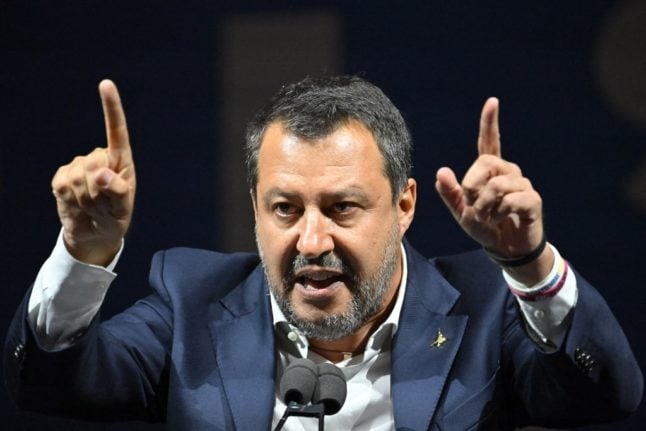 Matteo Salvini, leader of the anti-immigration League, has always put the 'Italians first' motto at the centre of his party's programme. Photo by Alberto PIZZOLI / AFP
Matteo Salvini, leader of the anti-immigration League, has always put the 'Italians first' motto at the centre of his party's programme. Photo by Alberto PIZZOLI / AFP
When previously interior minister in 2019 Salvini brought in a controversial ‘security decree’ which has since been scaled back. But it appears that it will be reintroduced with him back in government, as the manifesto section on immigration is topped by a bullet point that simply reads “security decrees”.
READ ALSO: ‘I plan to leave’: Foreigners in Italy fear for their futures if far right wins election
Other somewhat vague objectives include “combating irregular immigration and the orderly management of legal flows of immigration” and “promoting the inclusion of legal immigrants socially and in the workforce.”
Institutions
The coalition wants to change the constitution to ensure election by universal suffrage of the president, Italy's head of state who is currently chosen by parliament.
While it looks like the coalition will not take the ‘super majority’ needed in parliament to push through such changes without a referendum, it could hold a vote on the issue.
READ ALSO: Italian elections: What’s the difference between a majority and ‘super majority’?
The programme also includes a reference to move towards more regional autonomy, which remains a key issue for Salvini's League (formerly the Northern League).
It also calls for reform of the justice system to ensure the "reasonable duration" of trials - though judicial reform is already underway as part of the changes required by Brussels as part of the recovery fund deal.
Families
Italy has a declining population and the coalition vows to support the birth rate with measures including free nurseries.
It also calls for employment protection for young mothers, an increase in welfare payments for families, and support for families with disabled dependents.
Crime
The coalition promises, without going into detail, to crack down hard on petty crime, violence against women and the sale and diffusion of illegal drugs.
It also pledges to fight Italy’s mafias, as well as undefined “terrorism”, though it doesn’t explain how.
Energy and environment
It's notable that the coalition only mentions energy policy at the end of its programme, and again in very vague terms.
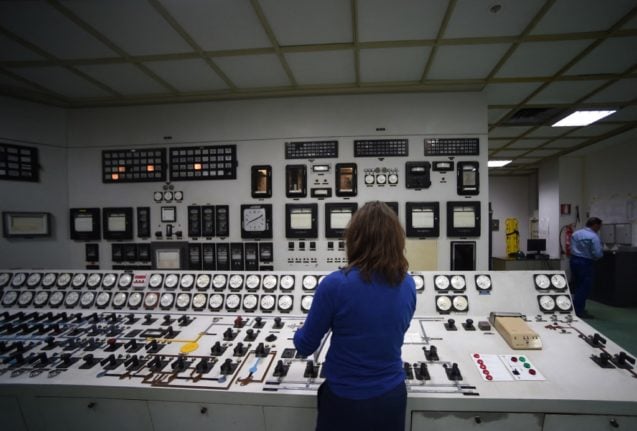
Italy rejected nuclear power after the Chernobyl accident but a return to nuclear energy is now in the cards. Photo by Filippo MONTEFORTE / AFP
Energy and environmental issues have been almost entirely absent from the election campaign, despite Italy's reliance on Russian gas being increasingly untenable due to the Ukraine war, and the increasing frequency of climate-related disasters such as the recent deadly flooding in Marche.
READ ALSO: EXPLAINED: How much are energy bills rising in Italy?
The programme proposes Italy should begin producing “clean and safe nuclear energy”, without giving any explanation as to what this might look like.
Despite the fact that the Italian public rejected nuclear power twice, in 1987 and 2011, the League in particular appears to want to give it another shot.
The coalition also pledges to increase the production of renewable energy.
They say only that they will diversify energy supplies and implement a plan for energy-self sufficiency, including using Italy's national resources, such as natural gas.
Comments
See Also
The three parties that make up Italy’s so-called centrodestra, the right-wing coalition that has stormed the polls and is now expected to form a government with a large majority, campaigned on a joint manifesto that promised to slash taxes and put ‘Italians first’ - whatever the cost.
The contents of the programme were agreed in advance between Giorgia Meloni's post-fascist Brothers of Italy, Matteo Salvini's populist League, and Silvio Berlusconi's conservative Forza Italia.
Meloni's success - topping the polls, well ahead of her allies - will likely affect how and if these pledges are implemented.
FdI is the most far-right of the three parties, so with them leading the government we can expect a focus on policies that align with its strongly nativist, conservative ideology.
Pledges made throughout the manifesto lack detail, but here’s an idea of what they’re promising to deliver once in power.
Economy and social policy
While the programme says Italy should make “full use” of the almost 200 billion euros ($193 billion) earmarked under the EU's post-pandemic recovery plan, it also talks about changing the agreement with Brussels.
Italy’s previous government agreed to major structural reforms in return for the money, which Meloni’s party appears keen to renegotiate.
The manifesto says there are "changed conditions", noting rising costs of energy and raw materials.

It calls for a reduction in the tax burden for families, businesses and the self-employed, including a flat tax for the latter. No detail was given as to how the parties plan to cover the cost of their vote-winning flat tax policies.
It pledges to abolish the citizens' income, Italy’s first ever unemployment benefit introduced under the populist Five Star Movement. It’s not clear whether anything would replace it.
The programme also calls for a revaluation of the minimum pension, social and disability payments.
As inflation soars, there’s a promise to protect the purchasing power of families, workers and pensions, and reduce VAT on energy products.
Europe and Russia
Salvini and Berlusconi have long been close to Russia. Berlusconi last week caused outrage by defending his old friend Vladimir Putin’s invasion of Ukraine, while Salvini has been highly critical of European sanctions.
Despite this, the programme emphasises respect for commitments made as part of NATO and support for Ukraine in the face of Russia's invasion.
READ ALSO: Outcry in Italy after Berlusconi defends Putin’s invasion of Ukraine

Meloni has backed the sanctions, and the sending of weapons to Kyiv - though in 2014 she voiced her support for Russia’s annexation of Crimea, so it’s not clear how credible her stance is or if it could change.
With Meloni and Salvini's parties both eurosceptic, the programme commits to "full adherence to the European integration process" while seeking a "more political and less bureaucratic" bloc.
READ ALSO: EXPLAINED: Is Brothers of Italy a ‘far right’ party?
It also calls for a review of EU rules on public spending and economic governance.
In line with FdI’s nativist stance, it calls for the defence and promotion of Europe's "Judeo-Christian" roots.
Immigration
Meloni and her coalition partner Salvini both rail against what they call a migrant “invasion”, with Meloni repeatedly calling for “naval blockades” to stop arrivals by sea.
The coalition pledges to create EU-managed centres in northern African countries to evaluate asylum applications.

When previously interior minister in 2019 Salvini brought in a controversial ‘security decree’ which has since been scaled back. But it appears that it will be reintroduced with him back in government, as the manifesto section on immigration is topped by a bullet point that simply reads “security decrees”.
READ ALSO: ‘I plan to leave’: Foreigners in Italy fear for their futures if far right wins election
Other somewhat vague objectives include “combating irregular immigration and the orderly management of legal flows of immigration” and “promoting the inclusion of legal immigrants socially and in the workforce.”
Institutions
The coalition wants to change the constitution to ensure election by universal suffrage of the president, Italy's head of state who is currently chosen by parliament.
While it looks like the coalition will not take the ‘super majority’ needed in parliament to push through such changes without a referendum, it could hold a vote on the issue.
READ ALSO: Italian elections: What’s the difference between a majority and ‘super majority’?
The programme also includes a reference to move towards more regional autonomy, which remains a key issue for Salvini's League (formerly the Northern League).
It also calls for reform of the justice system to ensure the "reasonable duration" of trials - though judicial reform is already underway as part of the changes required by Brussels as part of the recovery fund deal.
Families
Italy has a declining population and the coalition vows to support the birth rate with measures including free nurseries.
It also calls for employment protection for young mothers, an increase in welfare payments for families, and support for families with disabled dependents.
Crime
The coalition promises, without going into detail, to crack down hard on petty crime, violence against women and the sale and diffusion of illegal drugs.
It also pledges to fight Italy’s mafias, as well as undefined “terrorism”, though it doesn’t explain how.
Energy and environment
It's notable that the coalition only mentions energy policy at the end of its programme, and again in very vague terms.

Energy and environmental issues have been almost entirely absent from the election campaign, despite Italy's reliance on Russian gas being increasingly untenable due to the Ukraine war, and the increasing frequency of climate-related disasters such as the recent deadly flooding in Marche.
READ ALSO: EXPLAINED: How much are energy bills rising in Italy?
The programme proposes Italy should begin producing “clean and safe nuclear energy”, without giving any explanation as to what this might look like.
Despite the fact that the Italian public rejected nuclear power twice, in 1987 and 2011, the League in particular appears to want to give it another shot.
The coalition also pledges to increase the production of renewable energy.
They say only that they will diversify energy supplies and implement a plan for energy-self sufficiency, including using Italy's national resources, such as natural gas.
Join the conversation in our comments section below. Share your own views and experience and if you have a question or suggestion for our journalists then email us at [email protected].
Please keep comments civil, constructive and on topic – and make sure to read our terms of use before getting involved.
Please log in here to leave a comment.